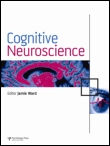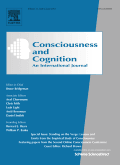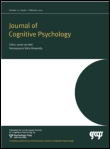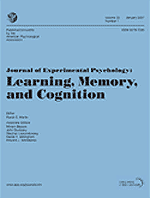
Cognitive Neuroscience
Scope & Guideline
Advancing Understanding of Mind and Brain
Introduction
Aims and Scopes
- Mechanistic Explanations:
The journal consistently emphasizes the need for mechanistic explanations in cognitive neuroscience, exploring how specific neural mechanisms contribute to cognitive processes. - Embodied Cognition:
A significant focus is placed on embodied cognition, investigating how cognitive processes are influenced by bodily states and interactions with the environment. - Individual Differences:
Research often incorporates individual differences, examining how variations in cognitive and neural processes can affect behavior and cognition across different populations. - Neural Correlates of Memory:
A core area of the journal is the exploration of memory systems, particularly the role of the hippocampus and other brain structures in different types of memory, such as implicit and working memory. - Emotion and Cognition:
The journal frequently addresses the intersection of emotion and cognitive processes, exploring how emotional states can influence cognitive functioning and decision-making. - Innovative Methodologies:
The journal highlights the use of diverse methodologies, including neuroimaging, electrophysiological measures, and computational modeling, to advance understanding in cognitive neuroscience.
Trending and Emerging
- Integration of Cognitive Neuroscience and Mechanistic Explanations:
Recent publications highlight a growing trend towards integrating cognitive neuroscience with mechanistic explanations, emphasizing how understanding the underlying neural mechanisms can enhance cognitive theories. - 4E Cognition Framework:
There is an increasing interest in the 4E cognition framework (Embodied, Embedded, Enacted, and Extended), which explores cognition as a dynamic process influenced by bodily and environmental interactions. - Implicit Memory and the Hippocampus:
Research focusing on the role of the hippocampus in implicit memory is gaining prominence, with studies investigating its involvement in various cognitive tasks and memory processes. - Emotional Dynamics in Cognition:
Emerging themes include the investigation of emotional dynamics in cognitive processes, particularly how emotions influence memory, attention, and decision-making. - Causal Investigations in Cognitive Processes:
There is a notable trend towards causal investigations using advanced methodologies, such as TMS and EEG, to elucidate the relationships between neural activity and cognitive functions.
Declining or Waning
- Sex Differences in Cognitive Neuroscience:
Although previously a significant focus, the frequency of studies specifically addressing sex differences in cognitive processes and brain function has diminished, possibly due to a broader shift towards more integrative approaches that encompass gender as a spectrum rather than binary distinctions. - Philosophical Theories of Consciousness:
Research centered on philosophical debates regarding consciousness has seen a decline, as the journal shifts towards empirical investigations and mechanistic explanations rather than theoretical discourse. - Traditional Neuroimaging Techniques:
There appears to be a reduction in studies solely relying on traditional neuroimaging techniques like fMRI, as researchers increasingly adopt multi-modal approaches that combine different methods for a more comprehensive understanding of cognitive processes.
Similar Journals

CONSCIOUSNESS AND COGNITION
Fostering Dialogue on Cognitive ProcessesConsciousness and Cognition is a prestigious academic journal dedicated to advancing the understanding of cognitive processes and consciousness. Published by Academic Press Inc, Elsevier Science, the journal has maintained a prominent presence in the field since its inception in 1992, reaching a converged publication timeline through 2024. With an impact factor reflecting its high relevance, it holds a Q1 rank in Arts and Humanities and Q2 ranks in both Developmental and Educational Psychology and Experimental and Cognitive Psychology as of 2023. Researchers and academics utilize this journal as a critical resource for the latest empirical findings, theoretical advancements, and innovative methodologies in understanding the intricacies of human cognition and conscious experience. Although it does not offer open access, the journal’s extensive contributions help shape active dialogues within this interdisciplinary domain, making it essential reading for professionals, researchers, and students alike striving to explore the mysteries of consciousness.

Journal of Cognitive Psychology
Engaging minds with cutting-edge insights.Journal of Cognitive Psychology is a premier peer-reviewed journal published by Routledge Journals, Taylor & Francis Ltd, located in the United Kingdom. With an ISSN of 2044-5911 and E-ISSN 2044-592X, this journal is dedicated to advancing the field of cognitive psychology by disseminating high-quality research findings and theoretical insights. Spanning from 2011 to 2024, the journal occupies a significant position in its field, classified in the Q3 quartile for 2023 in Experimental and Cognitive Psychology, and ranked #117 out of 165 in the Scopus database, indicating its relevance and contribution to the discipline. The impact factor reflects its evolving nature and the increasing interest in cognitive processes, making it a vital resource for researchers, professionals, and students alike. As the landscape of cognitive psychology continues to grow, the journal remains committed to exploring cutting-edge topics and methodologies, while engaging with dynamic challenges associated with cognition and behavior. Readers are encouraged to utilize the Open Access options available, ensuring seamless accessibility to this crucial body of work.

Language Cognition and Neuroscience
Advancing Knowledge at the Intersection of Cognition and LanguageLanguage Cognition and Neuroscience is a premier peer-reviewed journal published by ROUTLEDGE JOURNALS, TAYLOR & FRANCIS LTD, focusing on the intersection of linguistics, cognitive psychology, and neuroscience. Since its inception in 2013, this journal has established itself as a vital resource for researchers and scholars, contributing significantly to the understanding of how language is processed and represented in the brain. With its impressive rankings in various categories—Q1 in Linguistics and Language, Q2 in Cognitive Neuroscience, and Experimental and Cognitive Psychology—it caters to a diverse and interdisciplinary audience. The journal is accessible to readers worldwide, effectively communicating cutting-edge research and innovative methodologies in the field. Open Access options enable broader disseminations of knowledge, ensuring that significant findings reach both academic and practical applications. With a commitment to high-quality research, Language Cognition and Neuroscience continues to be an influential platform for advancing theories and practices within cognitive science and language studies.

Multisensory Research
Unlocking the Secrets of Sensory InteractionMultisensory Research is a premier academic journal published by BRILL, dedicated to advancing the fields of cognitive neuroscience, computer vision, and sensory systems. Established in the Netherlands, the journal boasts a diverse scope, exploring the integration of sensory modalities in both experimental and cognitive psychology. With its converged years extending from 2013 to 2024, Multisensory Research has consistently contributed valuable insights, earning a well-regarded position within various quartiles, notably Q2 in Computer Vision and Pattern Recognition and Q2 in Ophthalmology as of 2023. The journal’s rankings reflect its significant impact, with placements such as rank #50 in Ophthalmology and rank #84 in Experimental Psychology, highlighting its relevance to today's interdisciplinary research efforts. Available as an open-access platform, Multisensory Research ensures that innovative research is accessible to a wide audience, making it an essential resource for researchers, professionals, and students alike who are engaged in the dynamic study of multisensory integration.

Neuropsychologia
Unlocking the Secrets of the Mind through Innovative StudiesNeuropsychologia, published by PERGAMON-ELSEVIER SCIENCE LTD, is a premier journal that delves into the intersections of psychology and neuroscience, specifically focusing on behavioral and cognitive processes. Since its inception in 1963, this esteemed journal has been a vital platform for researchers, professionals, and students, showcasing innovative studies and advancements in the fields of Behavioral Neuroscience, Cognitive Neuroscience, and Experimental Psychology. With a commendable impact factor, placing it in the Q2 category across multiple disciplines, Neuropsychologia is recognized for its contribution to the scientific community, ranking among the top journals in both Experimental and Cognitive Psychology and Neuroscience. The journal's commitment to excellence is evident in its rigorous peer-review process and its mission to disseminate cutting-edge research, making it an invaluable resource for those seeking to expand their knowledge and insights in neuropsychology. For further reading, the journal is accessible in both print and digital formats, ensuring that researchers can easily engage with the latest findings and theoretical advancements in this dynamic field.

Journal of Cognitive Science
Exploring the Frontiers of Human ThoughtThe Journal of Cognitive Science, with ISSN 1598-2327, is a distinguished publication from SEOUL NATL UNIV, INST COGNITIVE SCIENCE, focusing on the multidisciplinary field of cognitive science. Established in 2016, this journal aims to advance knowledge in various domains, including Artificial Intelligence, Cognitive Neuroscience, and Experimental Psychology, while also delving into Linguistics and Language. Although currently categorized in Q4 for several subjects in the 2023 rankings, it presents an invaluable platform for innovative research and scholarly discourse, providing insights that connect cognitive processes with practical applications, thus fostering cross-disciplinary collaboration. Located in South Korea, the journal adheres to rigorous academic standards, inviting submissions that contribute significantly to understanding cognition in a digital age. While it does not offer Open Access, readers can access articles through university libraries and academic databases, engaging with the latest findings and theories that shape the future of cognitive science.

Cognitive Linguistic Studies
Innovating Perspectives in Cognitive Science and LinguisticsCognitive Linguistic Studies is a prestigious journal published by JOHN BENJAMINS PUBLISHING CO, dedicated to advancing the interdisciplinary field of cognitive linguistics. With an ISSN of 2213-8722 and an E-ISSN of 2213-8730, the journal serves as an essential platform for the dissemination of high-quality research that delves into the intricate relationships between language, thought, and cultural contexts. Located in the vibrant academic milieu of the Netherlands, this journal has gained recognition for its impactful contributions, reflected in its respectable Q2 category ranking within the field of Linguistics and Language as of 2023. Redesigned to accommodate a broader audience, the journal welcomes original research articles, reviews, and theoretical discussions that bridge cognitive science and linguistic inquiry. As the journal continues its trajectory of growth, being indexed with a solid Scopus rank of #459 out of 1167 in the social sciences, it remains a vital resource for researchers, professionals, and students eager to explore the dynamic interplay between cognition and language.

JOURNAL OF EXPERIMENTAL PSYCHOLOGY-LEARNING MEMORY AND COGNITION
Elevating knowledge in learning, memory, and cognition.JOURNAL OF EXPERIMENTAL PSYCHOLOGY-LEARNING MEMORY AND COGNITION is a premier publication of the American Psychological Association, focused on the intricate mechanisms of learning, memory, and cognition. Established in 1975, this esteemed journal has consistently delivered impactful research, evidenced by its Q1 ranking in both Experimental and Cognitive Psychology and Linguistics and Language categories for 2023. With an impressive impact factor and ranked in the top percentiles of multiple fields, it serves as a crucial resource for researchers, professionals, and students who aspire to deepen their understanding of cognitive processes. The journal’s rigorous peer-review process ensures that only the most innovative and high-quality studies are published, providing a platform for groundbreaking findings that advance the field. Though not open access, the insights within each issue are invaluable for anyone interested in the dynamics of human cognition and memory.

Journal of Neuropsychology
Connecting Minds: Where Psychology Meets NeuroscienceThe Journal of Neuropsychology, published by WILEY, is a premier academic journal dedicated to advancing the field of neuropsychology and its related disciplines. With a focus on behavioral and cognitive neuroscience, this journal presents cutting-edge research that informs our understanding of psychological functions and their underlying neural mechanisms. Operating with an impressive impact factor representative of its rigorous peer-review process, the journal has established itself within the Q2 and Q3 quartiles of multiple relevant categories, including Neuropsychology and Physiological Psychology. Researchers will find the ISSN 1748-6645 and E-ISSN 1748-6653 useful for academic referencing as they explore articles that span innovative methodologies and insights into neurological conditions. Published continuously since 2007, the Journal of Neuropsychology stands as a vital resource for professionals and students alike, fostering scholarly discourse and knowledge exchange in neuropsychological research.

BRAIN AND COGNITION
Unlocking the Mysteries of Brain and CognitionBRAIN AND COGNITION, published by Academic Press Inc Elsevier Science, stands as a vital resource for researchers and practitioners in the realms of cognitive neuroscience and psychology. Established in 1982, the journal has continuously evolved, showcasing cutting-edge research that bridges the understanding of brain functions and cognitive processes up to 2024. With an impressive impact factor reflecting its commitment to high-quality scholarship, the journal currently holds a prestigious Q1 ranking in Arts and Humanities (miscellaneous) and notable Q2 rankings in various psychology fields, including Cognitive Neuroscience, Developmental and Educational Psychology, Experimental and Cognitive Psychology, and Neuropsychology. This multidisciplinary journal cultivates a rich academic dialogue, offering valuable insights to professionals, researchers, and students alike. Although it does not offer open access, its robust indexing in Scopus and consistent contribution to important discussions in cognitive research define its critical role in advancing knowledge and innovation in the cognitive sciences.